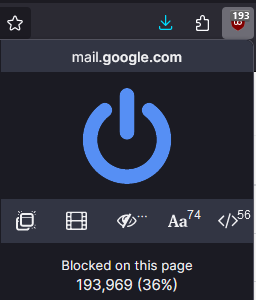I set up a Raspberry Pi 3 with AdguardHome for a friend of mine, and told him to disconnect everything at home and try to watch anything on his phone, being the only device using his home’s internet.
He just sent me this, and now he’s ready to #degoogle 🤣🤣🤣
He says there were hundreds in less than 5 minutes.
I agree that these should be blocked for privacy, but the amount of these requests is really completely meaningless. The reason there are so many is because they are blocked, not despite it. It will keep trying over and over on failure.
Yep, it’s the same with Plex analytics on my server. Every minute or so it’s reaching out to the void. I’ve disabled it on my accounts privacy settings page but it still tries.

They’re just too much, seriously. He’s getting a Pixel 6 Pro to put GraphenOS on it. I have the 7Pro and have been on Graphene or Calyx for about 2 years now. No regrets.
Tell him to make sure to change the Connectivity check domains to GrapheneOS ones. Plenty of people im this thread explained you about those. In theory, ypu could disable it, but the main OS will assume you have no connection, despite actually able to connect, and some apps may break.

Yup, that’s how I have mine as well. Good tip for all of us.
Is
GrapheneOS servernot the default?Don’t know how where to check to verify that. Hence me still recommending it to double check that.
Haven’t had any issues with it breaking. Some apps maybe need google play services to unfortunately I do use that since not everybody uses Unified Push
It’s really on more specific cases. I had it happen with a couple of apps that prevented me even trying to connect to it. I think the entire system should be fine working despite the connectivity check being entirely disabled.
there are hundreds because they got blocked.
android phones actively retry connectivity checks every 3 seconds until a successful connection is achieved, then it ramps down to a check every 5 minutes, and the default server is google’s. (this functionality is used for the little exclamation mark next to the wifi icon if there’s no internet connection)
no data is sent along that request (it’s just a GET request), not even useragent etc (the only thing google gets is the source of the request, aka the ip address, which is basically meaningless if it’s not associated with any other data)
you should actually be able to point that domain to any ip that responds with empty body + http 204 code to /generate_204 and it should work as expectedOh, cool. I’ll look into redirecting these to a 204. That should be a pretty interesting experiment for me. Thank you.
Bro its just one more connectivity check bro just another connectivity check bro its just a connectivity check bro
That shows they’re doing a connectivity check to see if they’re online (which they aren’t)… And grabbed Android TV channels.
Connectivity checks in particular are absolutely standard practice. Even many routers do them
I’m not convinced this is a good reason for dumping google
At this point, for me, any reason to dump Google is a good reason.
This is highly deceptive, and is actually worse than Apple staff implying macos can’t get viruses
Even Ubuntu and Debian do connectivity checks. Firefox does too: http://detectportal.firefox.com/success.txt .
There’s lots of valid things you could tell them, so why lie? Other people can easily prove it wrong…
They lie because it’s not about the truth. It’s about the clout.
Who’s lying? I’m confused.
deleted by creator
It’s less work than you think. It has a decent default setup and then you just unblock whatever you need when you realize something is dropping.
To be fair, I do agree the connectivity check should not be there. It should just let you connect to the network, and if it doesn’t have internet, then so be it. You’ll figure that out the second you try to load something. Plus, it makes it really annoying to set up a new Wi-Fi router or something without internet because you have to disable data and then turn on Wi-Fi and connect to the network to force it to stay on the network and not switch over to mobile data.
Lol… Disconnect all devices… That would take me a good half hour…
Just use the filter
I hear you. He has maybe 7 devices total in his house, whereas I have upwards of 150. I’d have to basically kill all my VLANs, create a temporary WiFi network just for this, and test, only to return everything back to normal afterwards. That’d be the easiest and fastest route for my infrastructure.
Un-de- the English languange from Latin influence. Ungoogle yourself!
language
influence
Why do you keep using French words then?
Why though?
deleted by creator
?
English is comes from the proto-Germanic family of languages. It was later when the Normans invaded the British Isles did the language begin to see Latin & French influences (which is one of the sources for English having terrible spelling rules). “de-” is of Latin etymology. “un-” is Germanic in origin. In many cases “un-” prefixes can be substituted. See: ungoogled-chromium.
family
invaded
Isles
Origins
substituted
Idk, sounds pretty latin bro…
The complete disregard for “purity” is what made English flexible enough to become the defacto default common language of most of the world. Your pursuit of language purity is in fact very un-English.
It is it de-English?
England colonizing every piece of land they could get their grubby hands on made English the defacto default common language of most of the world
so wait why the preference for de
You should learn programming first. Then get to kernel development level.
Really curious now. Why should I learn programming?
Getting to the level of a kernel dev, you will have a different look on “degoogling”, and even “android”.
OK, thanks. I am actually trying to get my feet wet in basic programming (starting a course on Rust), and most of the terms I’m seeing are alien to me. I’ve found myself spending a lot of time looking for definitions and such. Any suggestions? I’d appreciate any pointers for a smooth-ish start.
Programming is like solving math, I think?
If I were you, I’d learn C instead. Rust is not used (much) on low level development. Currently C is not replaceable.
I’ve heard the authors of C said: “C is not a big language, and it is not well served by a big book”. But it is so powerful, simple, and fast.
You already have a course on Rust, for “basic programming”, so keep going on the course for a while. Learning any programming language can make your mind. And it is a course, so I’d expect the authors of the course to familiarize you with definitions.
Yeah, its been pretty basic the first week. Lots of definitions like “object oriented”, “compiling” and such. I never thought of C. I was going to jump on Java first, but Rust has a very good rap as far as I’ve seen along devs, which is why I went with that instead. Goes to show how ignorant I am on the subject. Thanks a lot, really.
Keep with Rust, don’t listen to the guy suggesting C. In fact Rust is starting to be used in the Linux kernel if for some reason you ever wanted to do that.
Big language which is not yet considered to be “powerful” enough by the guy who rewrites the whole kernel in C++. Slow compile time, high memory usage.
C is a small language and it is as powerful as assembly.
But learning any programming language can still get your mind up.
Yes, and the guy wants to learn to programming and, for whatever reason, went with Rust. C is a bad choice for a first language, they will likely not enjoy it and quit. With Rust they have a fighting chance.
Yes, and the guy wants to learn to programming and, for whatever reason, went with Rust.
Ok.
C is a bad choice for a first language, they will likely not enjoy it and quit. With Rust they have a fighting chance.
Untested.
For rust specifically, I recommend checking out NoBoilerplate on YouTube. His videos are short, sweet and to the point, and they make you feel better about the progress you’re making. Also, LetsGetRusty is nice for when you are first going through the Rust Book, because he explains everything with examples
Awesome. Thanks so much for the tip. I subscribed just now (over Grayjay, of course, he he).
Ohhhh no, his phone checked to see if it was connected to the Internet! The horrors!
If you’re OK with that, good for you. I certainly dont want any of my devices hitting any server I didn’t explicitly approve of, especially not 100s of times in a few minutes. To each his own. You evidently don’t know what that means, enjoy.
It’s only happening that many times because you are blocking it, so it thinks it is disconnected and is checking to see if it managed to reconnect.
What does it mean?
I think it means op didn’t want replies out of their bubble and took that comment personally, hence ‘to each his own’
Or they’re a smug prick
I, too, would like to know what it means
What it means is that your devices and browsers are constantly pinging Google under the guise of “serving static content to speed up connection”. This is where each of us needs to determine what makes sense and what doesn’t. If I’m hitting sites not owned by Google, why does Google have to know about it? And even if they “need to know”, which they dont, why do you have to check so many times in a row in such short periods of time? Its all about knowing what you’re doing at all times, which comes with the added stress of them using up your data if limited, and slowing down your connection, however slightly it may be. Therefore, to each his own. I dont like that, so I block it. You dont mind? Fine, have at it, that’s your right. What I will certainly keep doing is trying to steer people away from just letting Big Tech do whatever they want, and that’s done by informing what these companies do, how and how often. Some people will care, and maybe even do something about it, others won’t and maybe even try to convince others that there’s nothing wrong with that. Again, to each his own.
Looking at how often requests happen is a red herring though. Your phone could be collecting data on you for a week and then send a single request with all of it. But I see lots people going “look how many requests” as if it was indicating anything. It’s bad that the requests are happening in the first place, but it doesn’t mean much that there are 10 requests at once or 1 request per hour.
In fact most analytics SDKs for mobile apps cache the events locally and send them in batches at some larger interval of time. And these single rarer requests are much more damaging to your privacy then lots of connectivity checks that don’t actually send any significant data.
That actually makes sense. Not that I’m happy with the constant phoning home of these a-holes, but it stands to reason that they would do that instead its way less conspicuous, so would be harder to point out as a trend.
To each his own, sure, but for most people that includes push notifications, and that’s how they work.
There are plenty of ways to get push notifications. Maybe they are not as convenient as letting Google do everything for you in exchange of your privacy, but certainly doable. Ironically enough, just google how to do it and you’ll find a few ways, lol.
If you did that though, wouldn’t you get pretty similar activity to what you’ve posted here? Just to servers other than Google’s
I’m not meaning to be contrarian to your point about this being a reason why you should de-google, just absent of context someone reading this post might be compelled to do so without understanding that is going to compromise functions of their device they’re likely accustomed to
You make a good point. I will try to start commenting and posting with more context moving forward. The fact remains that, as long as we’re using addresses not controlled by us (namely not self-hosted) we need to decide how much we trust any address and server we interact with. Maybe because of Google’s size and noise, I am completely against them, the same as I’m against Apple, Microsoft, Meta, Twitter, Amazon and a whole suite of others.
Agreed! Personally, my willingness to trust a service is generally a function of the utility I get from the service. My data has value, but I certainly wouldn’t consider it priceless!
I certainly dont want any of my devices hitting any server I didn’t explicitly approve of,
Then you can’t really browse the web lol. You will never have that much control.
Better to anonymize the traffic as much as possible
I can browse just fine, and I have plenty of sites and addresses blocked (4 million + last I checked). Yes, some sites and functionalities do break, but that’s the trade off, and we each have to decide what we want to live with and what we can live without. What works for me won’t necessarily work for you, and vice versa.
Work I agree with you. The point I’m trying to make is just asking for Google.com for example, could give you a different server between two requests.
You can control domains, but you cannot control servers, you can only trust that a domain doesn’t resolve to something malicious.
That’s one of the biggest issues. A domain that points somewhere right now could point to an entirely different server later, and we have no way of knowing until its too late. But we have become too dependent on this hyper-conectivity to easily move away from this. Its a challenge, for sure, but I enjoy the fight against these companies and the trolls they insert everywhere. Apparently this is the new way to have fun for me 🤪
I agree it’s definitely fun to see how far we can push it as consumers.
Long term. I do think the more sustainable solution is for people to run their own “Personal Clouds”.
It’s the 2nd “PC” revolution 🙂
I’ve been degoogled for so long that I can’t imagine ever going back to anything other than self-hosting. Sure, starting is not easy, buy once I got used to it, I could not be happier.








